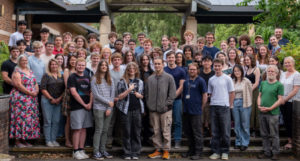Funding boost for digital tech circular economy network

Making the design and manufacturing of digital technologies more sustainable is the focus of a new research network that has received EPSRC funding of £2 million.
The Digital Innovation and Circular Economy (DICE) Network+ is a three-year programme that seeks to leverage the digitalisation of industry to foster a circular economy across sectors and value chains for digital and communication technologies.
Through interdisciplinary collaboration, research and technological innovation, the network will aim to develop circular solutions for issues such as the lack of circular economy (CE) principles in digital technology design and manufacture, and the poor understanding and coordination of digital advancements in supporting the CE transition.
Circular approaches design out waste and pollution and keep materials and products in circulation at their highest value for as long as possible.
A range of products and materials could potentially benefit – both economically and in terms of environmental impact – from a circular economy approach.
These include semiconductors, the tiny chips present in almost all electronic devices, which are produced using a significant amount of water, energy and raw materials, as well as solar PVs, which require aluminium, copper and silver for their manufacture, and have been identified as a problematic waste stream for the future.
The DICE network comprises 11 investigators from nine UK universities: Exeter (ECCE and INDEX), Swansea, Salford, Surrey, Open University, Southampton, Shefield, Queens University Belfast and Nottingham.
They bring expertise from engineering, materials science and social sciences, plus a wide range of partners, including universities, industry stakeholders and public bodies.
DICE’s activities will include mapping exercises, co-creation workshops, feasibility studies and demonstrator projects, and the development of a 10-year roadmap towards a digitally enabled circular economy.
It aims to benefit stakeholders through innovative outcomes, fostering knowledge exchange, and supporting projects that promote CE adoption.
This approach includes interdisciplinary collaboration, leveraging extensive existing networks (over £160m of funding since 2020) for maximum impact, and a structured programme under four pillars: Insight and Evidence, Inclusive Community, Capacity Building and Knowledge Exchange, and Research Impact and Legacy.
Professor Fiona Charnley, Principal Investigator and Co-Director of the Exeter Centre for Circular Economy, said: “This interdisciplinary collaboration is an exciting opportunity to develop strategies and solutions that address the significant challenges for digital and communication technologies, realising our vision of a circular economy across sectors and value chains through harnessing the power of the digital revolution.”



